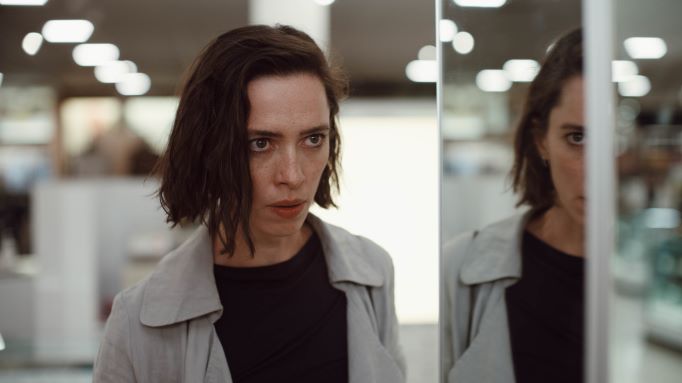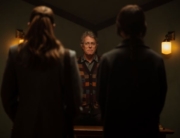![]() Resurrection begins with a woman asking for advice about a relationship, though it is not immediately clear where we are. Soon, we enter a corporate, almost colorless world. Nearly every surface is clean, beige, gray, or black. Pristine windows line equally pristine buildings and divide the rooms of superiors from the rest of the office. Everything here is modern, professional, productive. Even when Gwyn (Angela Wong Carbone), an intern, discusses relationship troubles with her superior, Margaret (Rebecca Hall), little unbridled emotion leaks through their conversation, and the answers as to what must be done are straightforward.
Resurrection begins with a woman asking for advice about a relationship, though it is not immediately clear where we are. Soon, we enter a corporate, almost colorless world. Nearly every surface is clean, beige, gray, or black. Pristine windows line equally pristine buildings and divide the rooms of superiors from the rest of the office. Everything here is modern, professional, productive. Even when Gwyn (Angela Wong Carbone), an intern, discusses relationship troubles with her superior, Margaret (Rebecca Hall), little unbridled emotion leaks through their conversation, and the answers as to what must be done are straightforward.
Margaret lives her life at an eerily high octane. Immediately, we wonder what she might be concealing. She aces her job (she works in biotech). She runs vigorously through the streets for exercise. She has equally vigorous sex with Peter (Michael Esper), a married co-worker, and is prepared to move on almost as soon as they finish. A single mom, she keeps a watchful, overbearing eye on her daughter, Abbie (Grace Kaufman), who is set to go away to college in a few weeks. Abbie is sullen, wears sweatpants, and loves to play the Elder Scrolls video game. She is increasingly fed up with her mother’s constant attention. A fall from a bike, which lands her in the hospital, does not help ease the dynamic between them.
Their world is upset by the gradual incursion of fairy-tail horror in the form of David (Tim Roth). To our eyes, he does not seem especially remarkable, just an older man with a genial manner who likes to sit on park benches. Margaret first sees him at a conference. He does not initially look her way nor acknowledge her until she approaches him. Yet Margaret is immediately struck with a visceral fear she first tries to stifle, then to confront. Soon, she is trying to find a way to negotiate with this dangerous man from her past and to keep her daughter safe. At the same time, she forbids Abbie to leave their apartment without explaining why or revealing anything about her past. Abbie, as a result, becomes frightened by and furious at her mother’s seemingly erratic behavior.
Hall’s performance is astonishing. She imbues Margaret’s struggle with an emotional reality and technical skill that affirms her as one our best actors. Episodes of violent craze, vulnerability, and motherly love (and those that combine all three) are played with equal verve and nuance. Her performance and writer/director Andrew Semans’s careful attention to atmosphere—which, like Rosemary’s Baby, reflects and interrogates the psychology of the protagonist—enhance the movie.
Yet all the performances are strong, and there is a special charm and menace to Roth, though David feels more like an archetypal boogeyman than like a fully realized character. Yet his calmness, the reasonable tone with which Roth delivers many of his lines, and his unremarkable appearance all lend his presence an effective menacing power. If there are some moderately clichéd turns in the script (Margaret’s artistic dreams long since abandoned), the strengths listed above overwhelmed them.
There are viewers who may find the third act ridiculous, and certainly one has to suspend one’s disbelief. Without ruining anything, the film fully embraces its fairy-tale roots (stories of a boogeyman who devours children) and goes to some wild and grotesque extremes, giving logistics a backseat. I won’t argue that those viewers aren’t right. Nevertheless, I was willing to go along for the ride. The illogical, nightmarish presence of David (who is a sort of monster issuing absurd demands like an especially evil Rumpelstiltskin) creates a compelling contrast to the office world Margaret hides in, while her fear and anger, those of a mother seeking to protect her child, were brought to life palpably enough that I was willing to drop objections. Like many strong horror films, Resurrection offers a good time. Even if its ending has triumphant aspects, the horrors remains.







Leave A Comment